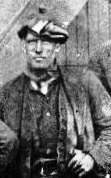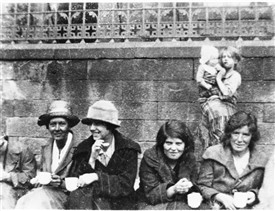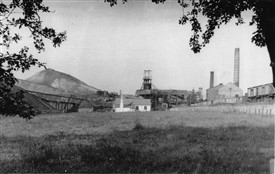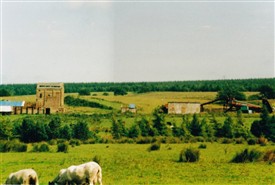The General Strike

A Loganlea miner
West Lothian Local History Library. All rights reserved.

Women sitting outside the West Calder Parish Office (now the dental surgery across from Wood's garage). They were protesting that the Parish Council had decided to cease payments to striking miners.
John Kelly. All rights reserved. S1. 96.

Loganlea Colliery and bing
Wm Aitchison. All rights reserved.

Remains of the Woodmuir Colliery buildings, just east of Briech.
West Lothian Local History Library. All rights reserved.
Addiewell and Loganlea and the General Strike of 1926
General Strike of 1926
In 1926, Britain's economy was struggling, and profits in the coal industry had fallen. The coalmasters announced they would cut miners' wages and increase their hours. The coalmining unions responded : 'Not a penny off the pay, not a minute on the day'. At the beginning of May, the unions called their members out on strike. The Trades Union Congress (TUC) called out other unions, notably the railwaymen, transport workers and the dockworkers, in support of the miners, and a General Strike began at the beginning of May.
Some miners set up road blocks in an attempt to prevent goods being moved about the country. The Midlothian Advertiser newspaper reported:
The village [Addiewell] was very quiet during the general strike. An attempt was made to hold up traffic on the road near Meadowhead, but on arrival of the police, the obstructions were removed. The oil workers have been fully employed during the crisis, the oil being run into one of the large stock tanks. The coal miners are still out, and it is uncertain when a settlement may be reached.
The General Strike lasted for nine days, from the 4th to the 13th May, then the TUC was told that it was illegal for other unions to be on strike in support of the miners. The other unions went back to work, leaving the coalminers to continue with their strike:
The End of the General Strike
The end of the general strike led to a more hopeful feeling in the oil trade. Necessary materials were brought in to keep the work going in full swing, and if the coal supply holds out, the oil workers are likely to remain unaffected by the stoppage.
Midlothian Advertiser, 21 May 1926, page 2
A small amount of strike pay was paid to the striking miners by their trade union in the early weeks of the strike:
Strike Money Scattered by Miner
An unusual scene which occurred while strike pay was being distributed in the Miners’ Welfare Institute, Loganlea, on Friday, was described at Edinburgh Sheriff Court on Saturday.
A miner named John Patrick McCairn, residing at 30 Loganlea Cottages, Addiewell was charged with having behaved in a disorderly manner, and wilfully and maliciously scattering the silver which was to be paid out to the strikers, as well as threatening to tear up a bundle of Treasury notes. Mc Cairn pleaded guilty.
It was explained that while the pay was being distributed, a discussion arose regarding the eligibility for payment of certain men who were alleged to be in arrears with their contributions [to the trade union]. Accused, who was present, made a disturbance, and without any warning he rushed over to the table, seized the bag containing the silver in one hand and the Treasury notes in the other. He threw the bag of silver to the extreme end of the hall, and made to tear up the banknotes when another man intervened. There was a general stampede for the money and the man in charge made a request that it should be handed over to him. When a balance was made up at the end of the day, it was found that £23 9s 6d had been lost. Accused said he had lost his temper over the way things were being done. Those in charge seemed to have it all their own way and the men who were receiving pay were not allowed to say anything. Sheriff Neish passed sentence of 14 days’ imprisonment.
Midlothian Advertiser , 21 May 1926, page 2
Blocking the Road
Charged with having on May 10 stopped a motor lorry on the Edinburgh to Ayr Road near Nether Longford and demanded the production of a ‘TUC permit’ from an Edinburgh driver, also with having placed on the carriageway of the road a tree, parts of other trees, and fence stakes to prevent the passage of vehicles, contrary to the Emergency Regulations, three Addiewell miners appeared in custody before Sheriff Jameson at Edinburgh Sheriff Court on Friday.
Two of the men, Patrick Foley and Edward Toner, pleaded guilty and were sent to prison for forty days, and also ordered to pay a fine of £5 each. A third man pleaded not guilty, and on the charge being withdrawn he was dismissed from the bar.
Mr R.D.C. McKechnie, Depute-Fiscal, stated that a hawthorn tree, 15 feet long, had been placed across the road in addition to branches of trees and eight stakes torn from a fence at the roadside. Two of the stakes had barbed wire wrapped round them, and altogether the material formed a fairly substantial obstruction.
The motor driver, who had been stopped by the men, had only been able to proceed after much argument, and the arrival of a police constable on a bicycle. The men were part of a crowd of some 40 youths and men.
An agent who appeared on behalf of the men said he did not want to suggest that the men did right in stopping the lorry, but they were ignorant of the Emergency Regulations and had believed they had a right to do so.
With regard to the obstruction on the road, the two men had told him that they did not place the obstacles on the road, and had tried to dissuade their companions from doing so. They pleaded guilty to this charge because they did not want to get their friends into trouble.
Midlothian Advertiser , 28 May 1926, page 2.
John McCairn of Addiewell was also accused on the same charge:
An agent stated... that he did not take any active part in the placing of the obstruction on the road. He had been engaged in picketing work with the other men. It was stated that McCairn had already been a fortnight in prison for committing a breach of the peace in connection with the payment of strike pay at Addiewell. Sheriff Jameson said that in respect that accused had already been in prison, in connection with the recent unfortunate strike, he would impose a lesser penalty than had been given in the case of the other two men, who were sent to prison for 40 days and fined £5 each. He recognised that in many cases of this kind, the men were the dupes of others and believed they had a right to act as they had done during industrial disputes, but the law could not take cognisance of that view.
Midlothian Advertiser , 4 June 1926, page 2.
After the first few weeks, strike pay ceased, and with no money coming into the home,the miners and their families faced great hardship. Most schools fed the miners' children at dinnertime, and some miners set up soup kitchens - making great pots of soups from vegetables donated by sympathetic farmers and shop-keepers. People who sympathised with the miners donated money to help feed them and their children, but as the weeks and months of the strike went by, many of the miners were forced to apply to the parish for poor relief - a humiliation for working men.
Coal Strike
Amongst the coal miners here the effects of the coal stoppage is being keenly felt. Some families have already been forced to accept parish relief and the number is likely to increase in the near future. The Education Authority are feeding necessitous cases at the schools.
Midlothian Advertiser , 18 June 1926, page 2.
Feeding Necessitous Children
Midlothian Education Authority held a special meeting on Tuesday when an appeal against a decision to discontinue the feeding of school children during the school holidays was considered.
The decision was reached at a meeting held two week ago, and on Tuesday the Authority agreed to resume the feeding of necessitous children, although the schools are closed for the summer vacation. Instructions were given that feeding be resumed as early as possible.
Strong protest against the former decision of the Authority were made by the Labour members, and a deputation representing miners expressed the opinion that the stoppage of meals would have a serious effect, both on the children, who would be the principal sufferers, and on the men on strike.
Midlothian Advertiser , 30 July 1926, page 2
Strike Relief to Stop
A conference of representatives of various Parish Councils in Midlothian and Haddingtonshire {East Lothian] was held... After discussion, the following resolution was adopted by nine votes to eight: ‘That notice should be given that payment of aliment will be stopped in... one or two weeks from the date of the meeting.
Midlothian Advertiser , 30 July 1926, page 2
This was the decision that led to Ma Moore's famous protest in West Calder. See the page on Ma Moore.
After many months on strike without pay, some local men took desperate measures. Miners burrowed into coal bings to get coal to heat their houses, or perhaps to sell to bring in a little money. It was very dangerous thing to attempt:
Fatal Accident at Refuse Bing
On Saturday afternoon last, Andrew Bryson, aged 67, labourer, who resided with his wife and family at 25 Westwood Rows, was engaged digging for coal in a refuse bing near Cuthill Farm, and while tunnelling into the bing for this purpose, the roof gave way, completely burying the unfortunate man. It was estimated there would be over a ton of stone and loose earth in the fall. A number of men engaged in coal-picking on the same bing rendered prompt assistance, but when Bryson was extricated, after a lapse of about half an hour, life was found to be extinct. Dr Seaward, Stoneyburn, was early on the scene, and made a careful examination. The body was afterwards removed to the man’s home in Westwood Rows. This is the first fatality of this nature in the district.
Midlothian Advertiser , 24 September 1926, page 2
After five or six months on strike, some miners were beginning to go back to work, worn down by the struggle to make ends meet with no pay coming in. This caused great anger and bitterness in the miners who were still continuing the strike.
Strike Notes
A few more miners made a re-start at West Mains Colliery on Sunday night, where a night shift was working for the first time since the strike.
Midlothian Advertiser , 26 November 1926, page 2
Eventually, after seven months on strike, the miners' union was forced to tell its members to end the strike and go back to work. The miners were defeated and obliged to accept longer hours and lower pay. But the strike passed into legend as a great demonstration of working class solidarity and the struggle to secure decent working pay and conditions:
The End of the Coal Strike
The longest coal strike in this country within the memory of anyone living came to an end on Saturday, when the miners in Scotland were recommended by their leaders to return to work. The advice was promptly obeyed. In almost every district the men reported for work on Monday and Tuesday. Owing to the long stoppage, however, the pits were not in a condition for a general resumption of work, and thousands of miners are still waiting on the pits being made safe and ready for them.
In some districts, it is feared that it will be a considerable time before all the men can get back. The heavy industries such as the iron and steel trades were severely hit by the long strike, and many of the blast furnaces may not be rekindled until after the new year.
At West Calder very few men started at Westmains Colliery this week as it was found that Scottish Oils Ltd had the colliery well staffed with miners from Woolfords. The unemployed men gathered at the Masonic hall on Tuesday and registered for the Unemployment Benefit. A large number of the United Collieries miners from Woodmuir, Loganlea and Stoneyburn also registered at West Calder. There was a long queue outside the hall, and the work of registration went on throughout the whole day. Fortunately the weather kept fine, and this made the long wait more bearable.
Midlothian Adveriser , 3 December 1926, page 2.
There was lasting ill-feeling between those who had drifted back to work and those who had stayed on strike, and it affected not just the miners themselves but also their families:
Woodmuir Miners’ Wife Attacked
Five Women Fined
Five women from Woodmuir were charged at Edinburgh Sheriff Court on Tuesday with having on 14th October assaulted the wife of a “safety man” who had returned to work at a pit in the locality. The accused women were Catherine Wood, Sarah Wilkinson, Elizabeth Fraser, Mary Jane Sweeney, all of Woodmuir Rows, and Margaret Quin of Blinkbonny Rows, all in the parish of West Calder.
Evidence was given by the assaulted woman, who stated that while she was explaining to the headmaster how her boy had been delayed at the dinner hour, Mrs Wood came into the room, but was sent away by the headmaster. Witness then described the attack made on her when she came out at the gate.
Accused in their evidence, all submitted alibis to the effect that they had not been at the scene of the assault at the time. Mrs Woods stated that she went to the school to see that her boy should not be punished following any complaint which the assaulted woman might have gone to make to the headmaster. On leaving the headmaster’s room, she went straight home, accompanied by Mrs Wilkinson, whom she met on the way.
After further evidence, Sheriff Jameson found the charges proved, and fined accused £3 each, with the alternative of twenty days’ imprisonment.
Midlothian Advertiser , 10 Dec 1926, page 2
Mining Notes
The men employed at the local collieries are gradually getting back to work. At Loganlea Colliery the average output of coal last week was about 450 tons. This while somewhat short of the pre-strike output, will no doubt be improved upon in the ensuing weeks.
Midlothian Advertiser , 17 December 1926, page 2
Woodmuir miners sent to prison
David Burton, 33 Breich Terrace, and James Quinn, 5 Blinkbonny Rows, West Calder, were sent to prison for 21 days at Edinburgh Sheriff Court on Tuesday for a contravention of the Conspiracy and Protection of Property Act. Accused were convicted on evidence of having, with a view to compelling a miner working at Woodmuir Colliery to abstain from duty, watched and besetted his house.
Giving evidence, the miner, who was the object of the accused’s attentions, said that when he arrived at his house in a bus, under police protection, he found a number of men lined up on the kerb. As he passed from the bus to the door, they raised their hats in mock ceremony.
Two buses were employed in carrying men between the colliery and the railway station, where they entrained for the various districts, from which they had been drawn. When the last bus had passed, the crowd followed it to the station. The crowd returned when the train left, and formed a procession round the back of witness’ house. They sang “Poor old Joe”, shouted and danced.
The accused denied that they had shouted. The noise, they declared, came from the women and children.
Midlothian Advertiser, 29 October 1926, page 2.